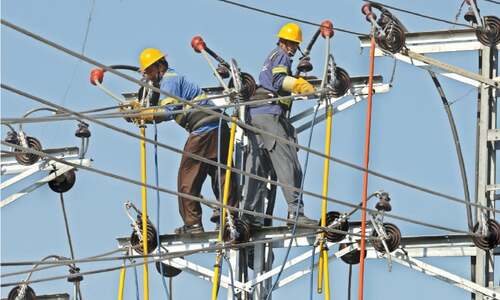• Lifeline consumers exempted from increase
• People using over 400 units a month to pay Rs7.50 more per kWh
• Nepra to hold public hearing tomorrow before implementing new rates
ISLAMABAD: The federal cabinet has approved the power regulator’s request to increase the national average tariff, which will see some residential consumers paying up to Rs7.50 more per unit.
The cabinet approved the hike through a summary on Friday and the decision was conveyed to the National Electric Power Regulatory Authority (Nepra) on Saturday.
Nepra has now set a public hearing for Monday (tomorrow) to fulfil the formalities before implementing the hike, which will retrospectively take effect from July 1 and will apply to all power distribution companies (Discos) and the Karachi-based private utility K-Electric.
Earlier this month, the power regulator raised the national average tariff by around Rs5 per unit (equal to one kilowatt-hour, or kWh) to ensure Rs3.28 trillion in funds to the loss-making power distribution companies during the current fiscal year.
The Rs4.96 hike was aimed at providing power firms with an additional Rs477bn in revenue. However, the government has the option to adjust different rates of increases for various consumer categories through cross-subsidy without affecting the overall revenue requirement determined by the regulator.
So, while the “lifeline” users consuming up to 100 units per month for six consecutive months will have no impact of the tariff hike, citizens using more than 400 units will be paying an additional Rs7.50 per unit.
In general, people using up to 100 units will pay Rs16.48 per unit after an increase of Rs3.
The new rate for the next slab — 101-200 units — will rise by Rs4 to Rs22.95 per unit; for 201-300 units by Rs5 to Rs27.14 per unit; and for 301-400 units by Rs6.5 to Rs32.03 per unit.
The next consumption slabs — 401-500, 501-600, 601-700, and 601-700 units — will see a tariff hike of Rs7.50 per unit, meaning the new per-unit new rates for them will be Rs35.24, Rs36.66, Rs37.80, and Rs42.72 per unit, respectively.
These rates exclude surcharges, taxes, duties and levies, which means the real applicable average national tariff will be higher. For instance, the tariff will be around Rs50.40 per unit for those consuming over 700 units per month.
Meanwhile, for commercial consumers lying in the A-2 category and having a peak load requirement of less than 5 kW, the base power tariff has been raised by Rs7.50 per unit to Rs37.75.
An equivalent tariff hike for “regular” consumers having a peak load requirement exceeding 5 kW will have them paying Rs39.43 per unit. The new tariff for electric vehicle charging stations will be Rs39.43 per unit after an increase of Rs8.4.
For commercial consumers lying in the General Services A-3 category, the base power tariff has also been hiked by Rs7.50 per unit to Rs37.31.
A similar hike has been made for industrial consumers, whose minimum electricity rate will be Rs31.93 and the maximum will be Rs37.89 per unit. The new tariff for agricultural tube wells will be Rs24.10 per unit after a Rs7.50 hike.
The tariff hike can be seen as a fulfilment of the government’s commitment to the International Monetary Fund to raise electricity rates.
Published in Dawn, July 23rd, 2023













































Dear visitor, the comments section is undergoing an overhaul and will return soon.